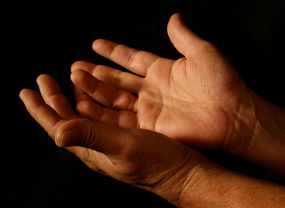Steve Bremner of the Fire on Your Head Podcast posted this graphic, and it got me thinking:

I was immediately struck by a one-word answer: disappointment. Christians in the West become disillusioned when we anticipate or expect an outcome and it does not meet expectations. The next time we confront a similar situation, heightened fear results.
The following passage bedeviled me for decades:
And I tell you, ask, and it will be given to you; seek, and you will find; knock, and it will be opened to you. For everyone who asks receives, and the one who seeks finds, and to the one who knocks it will be opened. What father among you, if his son asks for a fish, will instead of a fish give him a serpent; or if he asks for an egg, will give him a scorpion?
—Luke 11:9-12 ESV
I once had someone confess to me a lack of faith in God specifically because of me. How so? Because it made no sense to that person that someone who sought so hard to follow after God could have so many rotten things happen to him at the worst possible times as I did. That person had personally witnessed faithful, God-loving Dan asking God for eggs and getting what he thought were scorpions instead. Why serve a God who treated His most ardent followers that way?
What is behind that thinking? A Western view of entitlement and middle class privilege.
Jesus, a little later in Luke:
And he said to his disciples, “Therefore I tell you, do not be anxious about your life, what you will eat, nor about your body, what you will put on. For life is more than food, and the body more than clothing. Consider the ravens: they neither sow nor reap, they have neither storehouse nor barn, and yet God feeds them. Of how much more value are you than the birds! And which of you by being anxious can add a single hour to his span of life? If then you are not able to do as small a thing as that, why are you anxious about the rest? Consider the lilies, how they grow: they neither toil nor spin, yet I tell you, even Solomon in all his glory was not arrayed like one of these. But if God so clothes the grass, which is alive in the field today, and tomorrow is thrown into the oven, how much more will he clothe you, O you of little faith! And do not seek what you are to eat and what you are to drink, nor be worried. For all the nations of the world seek after these things, and your Father knows that you need them. Instead, seek his kingdom, and these things will be added to you. “Fear not, little flock, for it is your Father’s good pleasure to give you the kingdom. Sell your possessions, and give to the needy. Provide yourselves with moneybags that do not grow old, with a treasure in the heavens that does not fail, where no thief approaches and no moth destroys. For where your treasure is, there will your heart be also.”
—Luke 12:22-34 ESV
The Psalmist adds this:
The steps of a man are established by the LORD, when he delights in his way; though he fall, he shall not be cast headlong, for the LORD upholds his hand. I have been young, and now am old, yet I have not seen the righteous forsaken or his children begging for bread. He is ever lending generously, and his children become a blessing.
—Psalms 37:23-26 ESV
That said, when I look through the Scriptures, what I do not see is any promise of God that those who love Him should have a material expectation beyond God providing food and clothing. The Father promises not to let His children starve or go naked, but He makes no promises—for this life at least—that they will inhabit mansions.
Oh, and let’s make sure we look at all of the Luke 11 passage to understand what really matters most:
And I tell you, ask, and it will be given to you; seek, and you will find; knock, and it will be opened to you. For everyone who asks receives, and the one who seeks finds, and to the one who knocks it will be opened. What father among you, if his son asks for a fish, will instead of a fish give him a serpent; or if he asks for an egg, will give him a scorpion? If you then, who are evil, know how to give good gifts to your children, how much more will the heavenly Father give the Holy Spirit to those who ask him!”
—Luke 11:9-13 ESV
Read that concluding sentence again. What is God most concerned about giving us? His Holy Spirit. Him we can have without limit.
It’s not about stuff. It’s about God giving us more of Himself.
The problem for us in the West is that we’re not satisfied with more of God.
Truth is, we’re not even satisfied with our daily bread. Or with enough clothes to keep us from being naked.
Back in Jesus’ day, and throughout most of human history, if one had food and clothing, that was enough. Because too often, those items could not be assumed. Sieges during war rendered even a crust of bread a luxury, and war was a way of life. Enemies burned fields and stole livestock. Armies laid siege to walled cities for months and years until the people inside broke.
God tells us in His Word that His children should not worry about this. He will provide food and clothing.
For those of us in the West, though, that’s not enough.
Basic needs met? Pishaw! At minimum, we must have what the other guy has. Or more. Because having more than the other guy proves our smarts are better than his. Shows how we’re better all around. Wiser. More successful.
In the case of Western Christians, having more than the basics says that whatever we’re doing religiously, we’re doing it right. We are holier. We are more committed. Our doctrine is the right one. That poor slob of a failure over there? He’s reaping what he sowed. His doctrine was bad. He sinned. He let God (or in all too many cases, the pastor or the local church) down. The loser.
So if we have less, we get disappointed. If we think we’re doing this Christianity thing right and God does not marvelously fill our material coffers, then He is being a grinch. Even if we’re not living up to some “Christian” standard, we’re mad at God anyway for not dishing enough grace to help us keep up with the Joneses.
Disappointment.
That disappointment with our perception of God’s provision leads to fear. Fear that we’ve sinned somehow. Fear that our doctrine is wrong. Fear that our entire faith has been in vain. Fear that perhaps God is not there. Fear that if God is not there, then life is all on our shoulders, and it looks like we already screwed up that life or will do so in the future.
Fact is, the myriad fears we see in the Church today have basis in whatever past disappointments with God we let fester. Despite what God may think is best for us, we think He didn’t come through. Ultimately, it’s a complete breakdown in faith.
This is rampant in the American Church.
In some sectors, it’s prosperity gospel teaching that breeds this problem. In other sectors that consider themselves above prosperity gospel teaching and who look down their pious noses at any fool who believes such things, it’s the pride of American Dream living that breeds it.
Envy and pride. Unrestrained, that pair will always lead to disappointment, which leads to fear.
In the end, all you and I can do is be the person God has made us now. We turn to Him and can expect Him to give us food, clothing, and—without measure—His Holy Spirit. Comparing our reality against anyone else’s is wrong. If anything, I think the Bible teaches that material things only serve to weigh us down, to become the very worries that choke the seed we read about in the parable of the sower.
It’s not so much that we ask our Heavenly Father for an egg and He instead gives us a scorpion. It’s that we want a factory filled with eggs and want almost nothing of our Father Himself. And we get disappointed with Him when we see evidence that God might have something different for us. Then we become afraid that we will never get our egg factory and the world will think less of us for that “lack.” Suddenly, everything looks like scorpions.
More of you, Lord, and less of everything else. Let us eat our bread and wear our clothes with glad, thankful hearts, and a deep, profound love for you and for others, while we treat everything else we may receive in this pre-eternity like gravy. For where our treasure is, there will our heart be also.
 God dwells apart from time. He’s the attendant at both your departing train station and the station at the end of the line–at the same time. And He knows every happening in-between. You can’t fool Him, because he’s at the beginning, end, and all points along the way.
God dwells apart from time. He’s the attendant at both your departing train station and the station at the end of the line–at the same time. And He knows every happening in-between. You can’t fool Him, because he’s at the beginning, end, and all points along the way.
 One day, I cupped my hands in prayer and said, “God, fill these hands.”
One day, I cupped my hands in prayer and said, “God, fill these hands.”